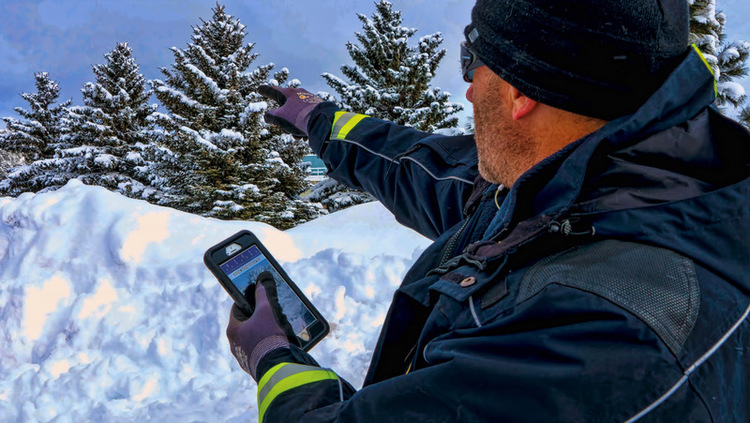Former FBI official Harlin McEwen won praise all around for his four years as an unpaid volunteer spearheading the planning for a new, nationwide emergency first-responders network. Not only that, he got himself a new gig: paid consultant to AT&T, the company awarded the federal contract for the new system, worth up to $47 billion.
Hired this past summer, McEwen isn’t the only public servant to wind up on AT&T’s payroll since it landed the contract in March. As the company tries to outflank competitors in states that might opt out of the federal system by a Dec. 28 deadline, it's snapping up state government insiders too. Those hires are raising concerns that governors might not be getting disinterested analysis for a vital decision about public safety.
“AT&T is buying off the people who would make the most noise,” said Scott Edson, executive director of an existing communications system for the Los Angeles area and skeptic of AT&T. Edson said he was shaken when McEwen, widely respected in the public safety sphere, popped up with AT&T. Without naming any individual, Edson said the people being hired "are the same ones who know what a bad deal this is.”
McEwen said he would never compromise his hard-earned reputation for integrity by doing favors for big business. “I don’t want to be tainted by someone insinuating I’m just a shill for AT&T,” he said from his home in upstate New York. “When I left, later, AT&T reached out to me and offered me a consulting position. They didn’t hire me. I’m paid as a consultant and just do a few hours here and there. I’m not working with them as a full-time employee.”
In New Jersey, the “state point of contact” in charge of advising Gov. Chris Christie on the opt-in/opt-out decision is now on board with AT&T. In Alabama, the official with the same position there is also now with AT&T. Less than two weeks after Maine became the 10th state to opt in last August, its director of emergency management resigned, only to resurface with AT&T.
Texas Gov. Greg Abbott’s office announced that its chief of staff, Daniel Hodge, was leaving for the private sector on Sept. 18, one day before announcing the state’s decision to partner with AT&T. Hodge now counts AT&T among his lobbying clients, according to disclosure forms filed with the Texas Ethics Commission.
And McEwen isn’t the only former federal figure to jump. In August 2016, Mike Bostic, a onetime Los Angeles assistant police chief, became senior law enforcement adviser to the new system, called the First Responder Network Authority -- FirstNet for short -- an independent entity within the Commerce Department. But he has moved on to AT&T. He now handles FirstNet-related duties with the company, according to his Twitter and LinkedIn accounts.
To some, this is what normal, if bare-knuckled, market competition looks like: a company with deep pockets seeking to win contracts worth billions. An AT&T spokesman insisted the company has carefully followed the rules while assembling its team in recent months.

“We are building a team of leaders who are passionate about and experienced in public safety to help ensure we get this right,” the company told RealClearInvestigations. “We undergo a careful review of non-compete and public ethics issues before bringing anyone to the team. We will continue to hire the most experienced and qualified candidates in compliance with applicable law to ensure that the FirstNet network is the best network for our nation’s first responders.”
AT&T declined to disclose how much its new hires are paid or what they do for the company. State databases say the ex-state officials' annual salaries in their former jobs ranged from $115,000 to $125,000, except for Hodge, the former Texas chief of staff, who made almost $207,000.
AT&T declined to make any of the new hires available for interviews, and RealClearInvestigations' repeated efforts to reach them, aside from McEwen, were unsuccessful, although the social-media profiles of some offer details on their FirstNet-related positions.
FirstNet had its genesis in the terror attacks of 9/11, when, in the view of many, more lives could have been saved had disparate first responders been able to communicate more effectively. New York firefighters and police officers weren’t always getting the same information, and transmitting data was especially difficult when speed was of the essence. (New York was still weighing a decision on FirstNet when it suffered a failed subway bombing this week.)
Communications problems have also arisen during natural disasters like Hurricane Katrina and later terrorist incidents such as the Boston Marathon bombing, when the needs of public safety and emergency crews overwhelmed sometimes damaged networks, leading to dropped calls and breakdowns, experts say.
The federal answer to such problems is FirstNet, described as a cutting-edge network on which first responders and public safety officials have “priority and preemption.” The federal government is providing the bandwidth and AT&T is building the network’s infrastructure. AT&T will charge participating agencies a monthly subscription fee for using the FirstNet network, and the company can also expect to make money by selling excess bandwidth to commercial clients.
Authorized by Congress in 2012, FirstNet was originally conceived as a single system for the entire country – a goal reflected in the contract AT&T was awarded in March. But Republican lawmakers, skeptical of the history of such federal initiatives, insisted each state be allowed to decide whether it wanted to join the national FirstNet or build out its own network that could plug into the national model.

That has sparked furious competition among AT&T and some telecommunications rivals, such as Rivada and Verizon. It has also, in the view of AT&T’s competitors, sparked some curious employment moves in the past several months.
“There is evidence from a number of states that the opt-in/opt-out decision-making process may have been influenced by job offers or other inducements to key decision makers,” said Brian Carney, a senior vice president with Rivada. “If true, that is a troubling development that raises serious questions about the integrity of the process, and it merits a full investigation by competent authorities.”
Even some outside observers expressed concern. Mike Copps, a former FCC commissioner now with the government watchdog group Common Cause, said his chief issue with FirstNet has been its seemingly interminable development, but he said the hiring patterns also troubled him. “I’m not going to offer a blanket statement about this, but certainly when you look at all of this in total it seems like something is amiss and should be looked at,” he said.
FirstNet officials said neither McEwen, who they said was unpaid at FirstNet, nor Bostic were involved in the selection of AT&T. FirstNet also noted AT&T isn’t the only one deploying heavyweights to help land the work. The Rivada Networks consortium, for instance, has hired some former public safety officials of its own, along with high-powered lobbyists like Jeb Bush and Karl Rove. When asked about such moves, a Rivada executive said that unlike AT&T, Rivada assembled its team in the years preceding the awarding of the national contract, and hasn’t been plucking state officials since.
AT&T’s challengers also dispute the merits of the telecommunications giant’s network. The critiques include a report prepared for the California’s Governor’s Office of Emergency Services that assessed AT&T’s proposal on multiple levels, including its compatibility with a system Edson and others had already put in place: the Los Angeles Regional Interoperable Communications System, or LA-RICS.
The reviews were harsh. Four aspects of AT&T’s proposal were graded on a 1-5 scale, with a 3 the threshold for meeting California’s needs. In every category, AT&T’s proposal fell short, earning an initial overall grade of 2, the report said. After AT&T was given a chance to respond to dozens of questions, the emergency-services office still withheld an endorsement. It concluded the state would be opting in to a poor plan or potentially facing severe financial consequences by opting out.
“FirstNet is appearing more as a marketing arm of AT&T and not the Emergency Services Network that Congress envisioned,” read one of the highlighted comments offered by an anonymous expert in the report. “Stop touting the grandeurs of AT&T and show us what we want to see.”
AT&T hinted last week it expects some governors to miss the Dec. 28 opt-in/opt-out deadline. Thus far, some three dozen states and U.S. territories have opted in to AT&T’s network, including the four states – Texas, Alabama, New Jersey and Maine – where state officials who appear to have been active in the selection process have since joined the telecommunications company in some fashion.
It is unclear if any of the AT&T hiring comes under state revolving-door statutes, laws that restrict the post-government-employment opportunities of public workers. Public reports in Alabama questioned if Ryan Burchnell, the former point-of-contact there now with AT&T, had run afoul of the revolving-door law. The state’s ethics commission declined to comment to RCI.

In Texas, where Daniel Hodge is now an AT&T lobbyist, the revolving-door law bars a former state officer or employee from working for a company for two years if that person “participated on behalf of the [state] agency in a procurement or contract negotiation” that involved that company.
The governor’s office did not reply to RealClearInvestigations’ emails and phone calls asking what role, if any, Hodge, long referred to as Abbott’s “right-hand man,” played in the Lone Star State’s opt-in decision. Ian Steusloff, general counsel for the Texas Ethics Commission, told RCI the revolving-door law isn’t crystal clear on whether the governor’s office constitutes a “regulatory agency.” A message left with Hodge’s lobbying firm was not returned.
In New Jersey, Gov. Christie’s office also did not respond to emails and phone calls asking about its point-of-contact, Fred Scalera, a former Democratic assemblyman who joined AT&T as a “market development manager – FirstNet Initiative at AT&T,” according to his LinkedIn profile. Scalera did not respond to questions sent through his LinkedIn account.
In New Hampshire, a state that has opted out, Gov. Chris Sununu chose Rivada, the company that retained Rove and Jeb Bush, the former Florida governor. Sununu is a Republican and the son of John Sununu, a close confidant of the Bush family and a former chief of staff for President George H.W. Bush.
Correction
Wednesday, Dec. 13, 2017, 6:34 PM Eastern
This article has been revised to reflect the following correction:
An earlier version of this article mischaracterized Colorado's status regarding the FirstNet system. Although the state has accepted a proposal from Rivada to build its communications network, Colorado had not formally opted out of the AT&T network at the time of this article's publication.



